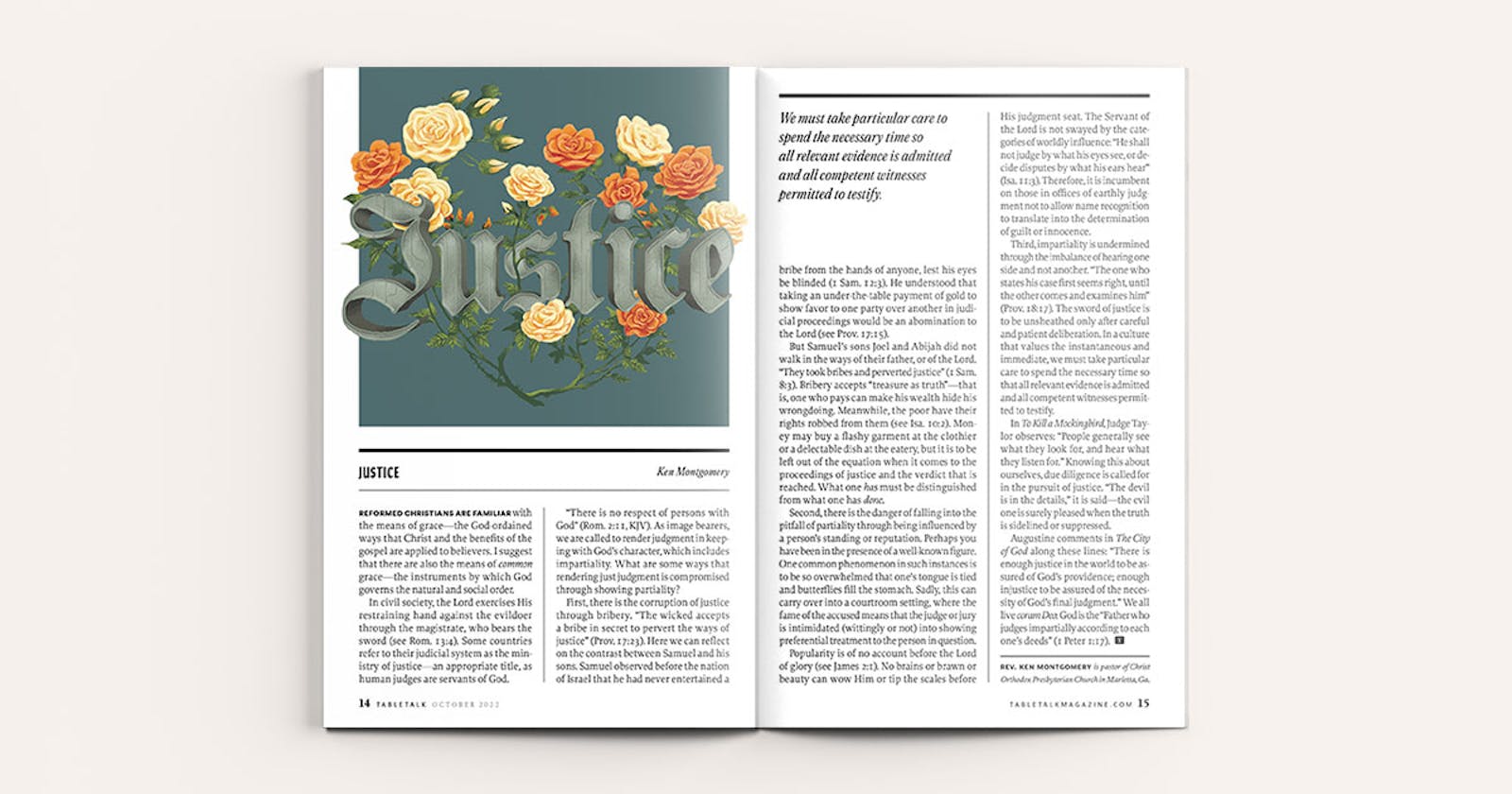
Request your free, three-month trial to Tabletalk magazine. You’ll receive the print issue monthly and gain immediate digital access to decades of archives. This trial is risk-free. No credit card required.
Try Tabletalk NowAlready receive Tabletalk magazine every month?
Verify your email address to gain unlimited access.
Reformed Christians are familiar with the means of grace—the God-ordained ways that Christ and the benefits of the gospel are applied to believers. I suggest that there are also the means of common grace—the instruments by which God governs the natural and social order.
In civil society, the Lord exercises His restraining hand against the evildoer through the magistrate, who bears the sword (see Rom. 13:4). Some countries refer to their judicial system as the ministry of justice—an appropriate title, as human judges are servants of God.
“There is no respect of persons with God” (Rom. 2:11, KJV). As image bearers, we are called to render judgment in keeping with God’s character, which includes impartiality. What are some ways that rendering just judgment is compromised through showing partiality?
First, there is the corruption of justice through bribery. “The wicked accepts a bribe in secret to pervert the ways of justice” (Prov. 17:23). Here we can reflect on the contrast between Samuel and his sons. Samuel observed before the nation of Israel that he had never entertained a bribe from the hands of anyone, lest his eyes be blinded (1 Sam. 12:3). He understood that taking an under-the-table payment of gold to show favor to one party over another in judicial proceedings would be an abomination to the Lord (see Prov. 17:15).
But Samuel’s sons Joel and Abijah did not walk in the ways of their father, or of the Lord. “They took bribes and perverted justice” (1 Sam. 8:3). Bribery accepts “treasure as truth”—that is, one who pays can make his wealth hide his wrongdoing. Meanwhile, the poor have their rights robbed from them (see Isa. 10:2). Money may buy a flashy garment at the clothier or a delectable dish at the eatery, but it is to be left out of the equation when it comes to the proceedings of justice and the verdict that is reached. What one has must be distinguished from what one has done.
Second, there is the danger of falling into the pitfall of partiality through being influenced by a person’s standing or reputation. Perhaps you have been in the presence of a well-known figure. One common phenomenon in such instances is to be so overwhelmed that one’s tongue is tied and butterflies fill the stomach. Sadly, this can carry over into a courtroom setting, where the fame of the accused means that the judge or jury is intimidated (wittingly or not) into showing preferential treatment to the person in question.
Popularity is of no account before the Lord of glory (see James 2:1). No brains or brawn or beauty can wow Him or tip the scales before His judgment seat. The Servant of the Lord is not swayed by the categories of worldly influence: “He shall not judge by what his eyes see, or decide disputes by what his ears hear” (Isa. 11:3). Therefore, it is incumbent on those in offices of earthly judgment not to allow name recognition to translate into the determination of guilt or innocence.

Third, impartiality is undermined through the imbalance of hearing one side and not another. “The one who states his case first seems right, until the other comes and examines him” (Prov. 18:17). The sword of justice is to be unsheathed only after careful and patient deliberation. In a culture that values the instantaneous and immediate, we must take particular care to spend the necessary time so that all relevant evidence is admitted and all competent witnesses permitted to testify.
In To Kill a Mockingbird, Judge Taylor observes: “People generally see what they look for, and hear what they listen for.” Knowing this about ourselves, due diligence is called for in the pursuit of justice. “The devil is in the details,” it is said—the evil one is surely pleased when the truth is sidelined or suppressed.
Augustine comments in The City of God along these lines: “There is enough justice in the world to be assured of God’s providence; enough injustice to be assured of the necessity of God’s final judgment.” We all live coram Deo: God is the “Father who judges impartially according to each one’s deeds” (1 Peter 1:17).
